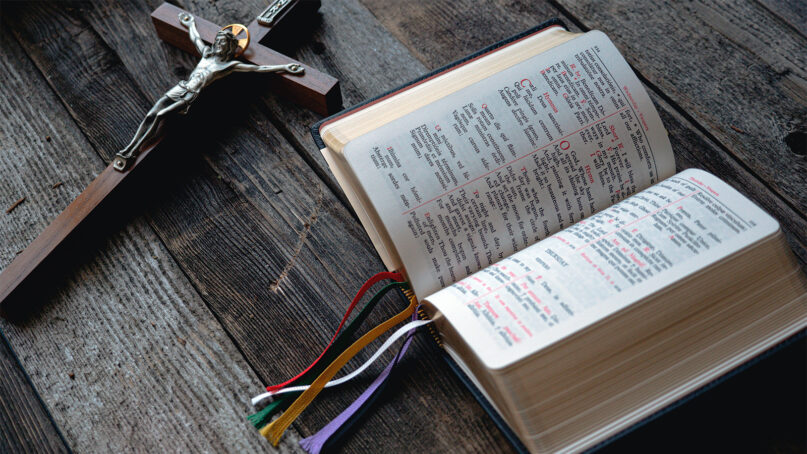(RNS) — Nearly six decades after the Second Vatican Council called for a renewal of Catholic-Jewish relations, American Catholics exhibit a marked lack of knowledge of their church’s teachings about Judaism, according to wide-ranging new survey of U.S. Catholic views on Jews, Judaism and the Israel-Palestine conflict.
“The survey shows that there’s a need to more intensely raise the consciousness of American Catholics about Catholic views on the Bible and understandings of Jewish covenantal life,” said Philip Cunningham, director of St. Joseph’s Institute for Jewish-Catholic Relations, which conducted the survey in July 2022 with SurveyUSA.
Most surprising among the survey’s findings is that fewer than half of U.S. Catholics affirm the idea that God’s covenant with the Jewish people remains intact, with just 41.7% of U.S. Catholics responding yes. More than 42% said they didn’t know, and 15.8% said the covenant either ended or never existed.
Echoing the documents and pronouncements of several of his predecessors, Pope Francis wrote in 2013 that Catholics “hold the Jewish people in special regard because their covenant with God has never been revoked.”
Cunningham, the author of a forthcoming paper on the survey’s results along with three other scholars — Adam Gregerman from St. Joseph’s, Kirill Bumin of Stonehill College and Motti Inbari the University of North Carolina at Pembroke — noted Catholics were significantly more likely to affirm Catholic teaching regarding the crucifixion of Jesus Christ. Nearly 70% of respondents blamed “the sins of humanity” (41.6%) or Roman soldiers and Pontius Pilate (28.2%).
Even so, the scholars seemed unsettled that roughly 30% of U.S. Catholics didn’t know (9.6%), thought no one is to blame (9.6%) or openly blamed Jewish people (11%).
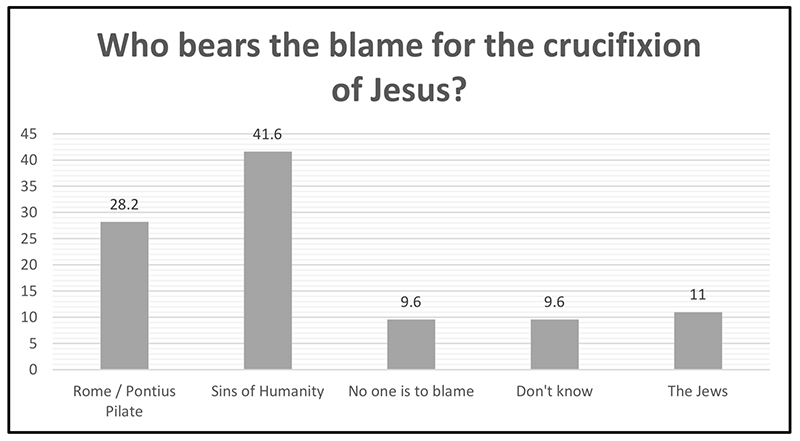
“Who bears the blame for the crucifixion of Jesus?” Courtesy graphic
“The fact that the Second Vatican Council authoritatively and explicitly rejected the historically inflammatory notion that Jews were ‘rejected or accursed’ could lead to the conclusion that a ‘passing grade’ of 70% on this crucial issue is unacceptably low for Catholic religious education,” reads the paper.
In a parallel finding, Catholics who consider the Bible the word of God and say Scripture should be taken literally (37%) — itself contrary to Catholic teaching — were more likely to blame “the Jews” for Christ’s crucifixion and say that God’s covenant with the Jewish people had ended with Christ’s death.
Regular churchgoers were 19.2% more likely to have negative ideas about Jews and Judaism than less frequent worshippers.
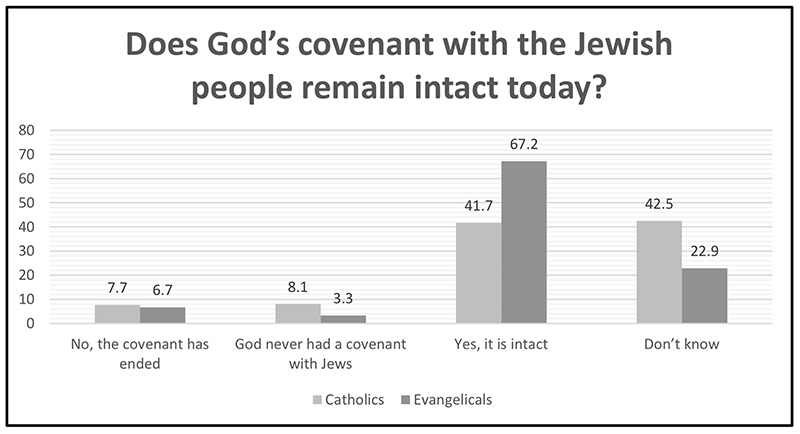
“Does God’s covenant with the Jewish people remain intact today?” Courtesy graphic
Anti-Jewish views were more common as well among Catholics under 30, fewer of whom said that Jews enjoy an ongoing relationship with God than older ones (30% vs. 36.8%). Younger Catholics were also less likely to say the Jewish covenant with God continues (32.5% vs. 43.1%). And they were less likely to say they were worried about antisemitism (24.4%) than older Catholics (40.2%).
The survey drew from a separate poll conducted by another set of researchers in 2021 that asked many of the same questions of evangelical Christians. When compared to the new poll, evangelicals were significantly more likely than Catholics to have “good or very good” views of Jews (65% vs. 54.2%) but were less likely than Catholics to say the same about Muslims (25.6% vs. 31.7%). Evangelicals were also notably more likely to have a poor or very poor opinion of Muslims (27.5%) compared with Catholics (12.8%).
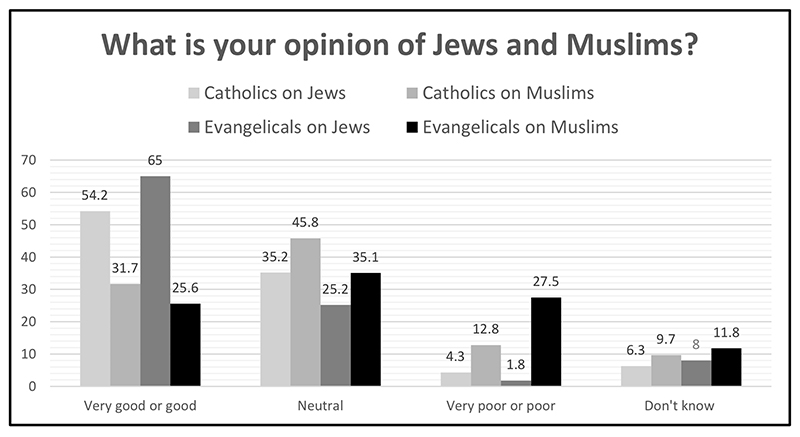
“What is your opinion of Jews and Muslims?” Courtesy graphic
Majorities of both Catholics (68.4% ) and evangelicals (64.5%) said they were not very knowledgeable about the Israel-Palestine conflict. Asked whether they supported the cause of Israel or of Palestinians, the largest subset of both groups said they supported neither (35.1% of Catholics, 30.6% of evangelicals), though evangelicals were notably more likely to say they strongly supported Israel (11.5% of Catholics vs. 25.4% of evangelicals).
Evangelicals (41.1%) were also more likely than Catholics (25.7%) to say that U.S. foreign policy should favor Israel, whereas Catholics (52.6%) were more likely than evangelicals (37.6%) to argue the U.S. should remain neutral or not take sides.
Geopolitics aside, Cunningham suggested the survey hints that Catholic leaders have work to do when it comes to educating the U.S. faithful regarding church teaching on Judaism.
“We saw the tendency for Catholics who claim to know Catholic teaching, to actually not know that teaching as well as they thought … and to actually be more likely to hold negative attitudes toward Jews,” he said.
The survey, which was conducted online, interviewed 1,241 respondents and had a margin of error of 3.2 percentage points.
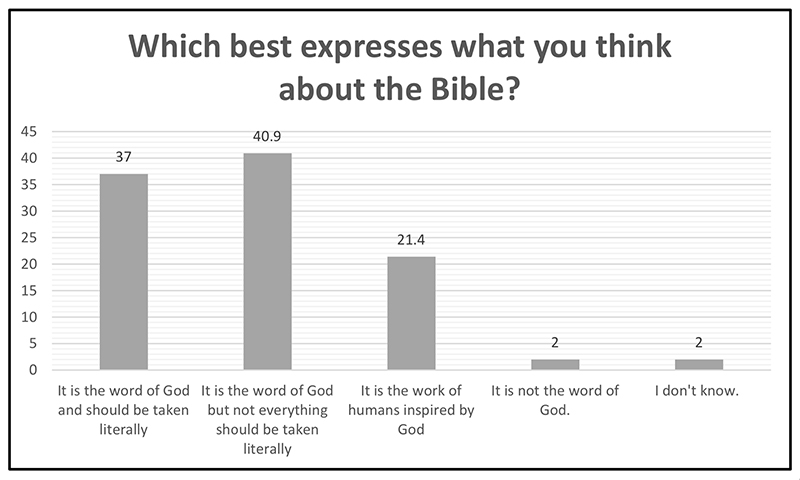
“Which best expresses what you think about the Bible?” Courtesy graphic
